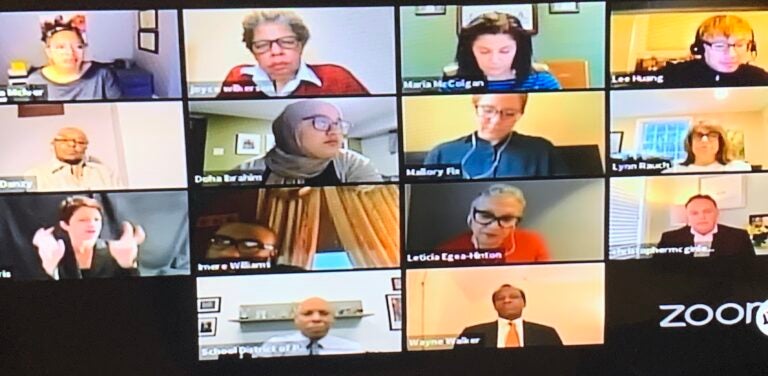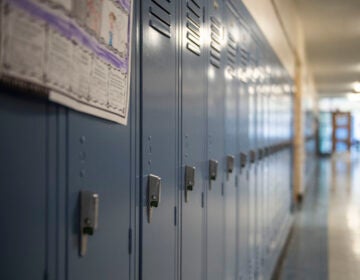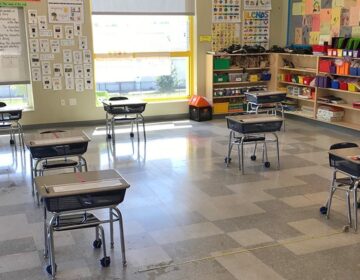Philly school board starts closure process for two Universal charters, calls for more stimulus funding
The Philadelphia School Board renewed three charters, authorized classroom upgrades and moved to protect transgender students online.

A screenshot of the Board of Education action meeting on April 30.
This article originally appeared on The Notebook.
___
The Philadelphia Board of Education voted Thursday to start the closure process for two charter schools, while approving renewals for three more.
At its monthly action meeting, held virtually using Zoom and broadcast live over the Internet and public access television, the board agreed to send “notices of non-renewal” to two West Philadelphia schools run by Universal Companies, Bluford and Daroff. That begins a potentially lengthy closure process that could last years. Both schools have long records of poor academic performance, as well as financial and administrative problems.
The board also voted to grant five-year renewals to three other charter schools: Northwood Academy in Frankford, Imhotep Institute in Germantown, and the People for People Charter School in Fairmount.
Together, the three renewed schools serve about 1,900 students. The board did not offer an estimate of the cost of the renewals. Lisa Haver of the Alliance for Philadelphia Public Schools (APPS) testified that her group estimates that the likely cost would be in the neighborhood of $200 million over the next five years.
The rejected Universal schools, Daroff (K-8) and Bluford (K-6), serve about 720 and 530 students respectively. Both are “Renaissance” charters, meaning they serve in place of typical District neighborhood schools. Rather than using a lottery, Renaissance charters must accept all students in their catchments.
It is not clear if Universal officials will appeal the non-renewal decision to the Charter Appeals Board in Harrisburg, a step that could kick off a lengthy review process. But in a statement following the vote, a Universal spokesperson said the nonprofit would “defend” its schools “vigorously,” claiming that their schools are “outpacing many of the School District of Philadelphia Schools in our respective peer groups …. and meeting the benchmark in organizational structure and finances.”
District assessments tell a much different story about both schools, indicating that both Bluford and Daroff have consistently fallen well short of District standards on multiple academic and administrative fronts.
According to reports from the Charter Schools Office, both Bluford and Daroff have underperformed their peers on academic measures. District assessments show that over the last four years, both have fared poorly when compared to “similar” schools. Likewise, on management measures, both Bluford and Daroff earned a “does not meet standards” rating – the District’s lowest – for finances and administration.
At both schools, classroom observers noted “mixed” levels of quality instruction and student engagement. The District’s assessments also point to poor board practices, including ethically questionable actions such board members using school buildings for private charity events.
Thursday, the board approved the non-renewals without comment. Only one board member cast a vote in favor of Universal, with Julia Danzy voting to leave Bluford open. The vote to close Daroff was unanimous.
Universal alleges “bias” while critics cite data
Universal officials have questioned the objectivity of District assessments. Prior to Thursday’s vote, Universal vice president Penny Nixon testified that “bias” on the part of the Charter Schools Office may have skewed its findings. Nixon did not elaborate on her allegation, but requested a postponement of the non-renewal vote, saying that the schools deserved more time to craft an answer to its concerns.
“The schools were granted five days to respond,” Nixon said. “Given the current conditions, a response in five days is not fair.”
The board also heard from several Universal staff members and supporters, including Francisco Echevarria, a former parent and current teacher who praised the schools’ ability to build relationships with students and help them “muscle through” problems, even during the coronavirus shutdown.
“Even in this rough time, we’ve been able to maintain our relationships,” said Echevarria.
However, others urged the board to close the schools. Tomea Sippio-Smith of Public Citizens for Children and Youth called the Universal schools’ performance “abysmal” and urged the board to spend its money on more effective options.
“Now, more than ever, the district must consider whether the investments it makes are wise, given its projected $1 billion dollar deficit,” said Sippio-Smith in a statement. “The district cannot afford to pay tuition bills for schools that consistently fail its students.”
After voting to start the non-renewal process, District officials discussed potentially “retiring” the “Renaissance” program under which Bluford, Daroff and other Districts schools that had been converted to charters for “turnaround” are required to serve as neighborhood schools, taking students by catchment instead of lottery. The District counts a total of 21 Renaissance schools in an initiative that dates to 2011. Departing board member Chris McGinley said that the District should consider ending the Renaissance program entirely.
“For me the model represents an abandonment … of the neediest parts of the city,” said McGinley. “It was a bad idea to begin with,” he said, with no mechanism for ensuring that the charters would consistently meet high standards. “There was no accountability built in.”
On Thursday, McGinley said he’d hoped to introduce a resolution to formally “retire” the Renaissance program, but after discussion, the board agreed that due to procedural obstacles – such as the need to take public testimony – the proposal should be set aside for now. But board member Mallory Fix Lopez promised to re-introduced a resolution to end the Renaissance program “within six months,” and board president Joyce Wilkerson said she’d support that effort.
“I’d like to see it considered before the end of the year,” said Wilkerson, who added that the District is currently studying the “validity” of the work being done by Renaissance charters.
Board pushes charter reform, stimulus spending
The board also approved two resolutions on budget issues, one calling for charter school funding reform, and the other reiterating the need for full state funding during the coming budget crisis.
The charter resolution claims that state law sends a “disproportionate amount of money to charter schools”, including cyber charters, whose funding formula is identical to that of brick-and-mortar schools. It claims that “charter school students make up approximately 37.3% of public school enrollment in Philadelphia” but “have received nearly 51% of all new education dollars since 2015.”
The board’s resolution called on state officials to “meaningfully revise the existing inequitable charter school funding systems.”
A proposal from Governor Tom Wolf to do just that has faced stiff opposition from charter advocates.
On Thursday, Jessica Hickernell, a spokesperson for the Pennsylvania Coalition of Public Charter Schools, chided the board for taking up the question of charter funding when it is still trying to get laptops to students.
“At this point, we are not surprised that the Philadelphia School Board is considering this resolution but we do believe it is distasteful that they are choosing to spend their time attacking charters when so many of their students still aren’t receiving robust continuity of education,” said Hickernell. “It is clear that the Board’s priorities are misplaced.”
On Thursday, the board also approved a last-minute “walk on” resolution calling for more stimulus funding from the federal government, and a commitment from the state to use that stimulus to “supplement, not supplant” its own funding.
The stimulus resolution calls for “an additional $200 billion in federal relief for public schools nationwide,” and calls on state lawmakers to avoid a repeat of the post-recession spending cuts made under Governor Tom Corbett, which gutted school district budgets statewide.
“Pennsylvania school districts have not fully recovered from state cuts to education during the Great Recession,” the stimulus resolution read. “State and federal officials need to prioritize funding for education to avoid a similar school district funding crisis.”
Board president Wilkerson used her introductory comments to highlight the District’s financial concerns and urge action.
“In the span of one month, we have gone from a position of financial stability to one of deep uncertainty,” Wilkerson said, urging Philadelphians to contact federal and state and legislators, and ask them to both pass a federal stimulus and commit to healthy spending at the state level.
“The budget must keep public education whole,” Wilkerson said. “We need you to reach out now. Tell them, keep education funding at the 2020 level … if funding from the state falls, the District will face a budget crisis even greater than what we’ve lived through for the last ten years.”
In other news…
District officials say they’re taking steps to protect transgender students who do not want their parents to see that they are using a new name.
The problem arose when trans students and teachers discovered the challenge of getting Google Classroom to allow students to change their name in the computer system, without exposing the change to parents or others who may not support the student’s choice. Correcting the issue means the District can remain in compliance with Policy 252, meant to “ensure safety, equity, and justice for all students regardless of gender identity or gender expression.”
“We’ve solved the technical problem,” said Superintendent William Hite, “now we’re trying to make sure we don’t create an additional problem … for the child who did not want their parent to know that they’re using a different name.”
Board member Mallory Fix Lopez said that ensuring that students see the name they want to see is no small matter; students do better academically and socially when their preferred names and pronouns are used, she said.
“This is something that has been eating at me,” said Fix Lopez, thanking Hite and his team for tackling the problem. “If I’m feeling this way, I can only imagine how a student might feel,” Fix Lopez said.
But teacher Maddie Luebbert said the District isn’t doing enough for LGTBQ staff and students. Policy 252 lacks a clear complaint process or enforcement mechanism, Luebbert said, and staff need better training in LGBTQ issues. “Please enforce policy 252,” Leubbert said. “Strengthen your commitment to queer people in our schools.”
Also in other news…
Officials approved $18.2 million for “classroom modernization” over the summer. The project will upgrade 147 classrooms in 11 elementary schools, including Gompers, Cayuga, Key, Sharswood, Ellwood, Fox Chase, Welsh, Pollock, Kelly, Marshall, and the Overbrook Educational Center. The goal is to advance the District’s goal of improving literacy-based learning for young students.
Several board members expressed concern with the District’s capacity to manage the work, including Fix Lopez, who worried that projects started this summer may not be finished by September, forcing the District to once again shuffle students through various “swing spaces” as it did during the Ben Franklin High fiasco.
“I think it’d be irresponsible for us to put ourselves in that situation,” said Fix Lopez. “For me, it’s not an issue of modernization … it’s an issue of capacity at this time.”
But others countered that now is a good time to show students that the District can make progress. “It’s almost irresponsible … to back off anything that promotes academic achievement,” said board member Maria McColgan. “I’d like to see it go forward … in a safe way.”
Superintendent Hite said that the District’s new project management firm will help ensure that the summer’s work goes smoothly. His team has assessed its own capacity and “we have found that it is possible to deliver this project,” said Hite. Among other things, Hite said, the work will include cleaning up lead and asbestos where needed. “Of all the things we do, these types of modernizations become the most transformational, educationally,” Hite said.
The modernization project was approved 6-3, with Fix Lopez, Wayne Walker, and Angela McIver opposing. Funds will come from the District’s recent bond issue, not its operating budget.
WHYY is your source for fact-based, in-depth journalism and information. As a nonprofit organization, we rely on financial support from readers like you. Please give today.




